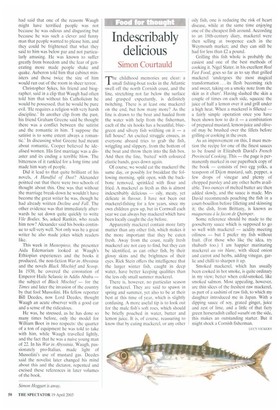Indescribably delicious
Simon Courtauld
The childhood memories are clear: a small fishing-boat rocks in the Atlantic swell off the north Cornish coast, and the line, stretching not far below the surface and grasped expectantly, is definitely twitching. There is at least one mackerel on the end, but how many more? As the line is drawn to the boat and hauled from the water with help from the fisherman, each of the six hooks has a beautiful, bluegreen and silvery fish writhing on it — a full house! An excited struggle ensues, as everyone aboard tries to grab the fish, wriggling and slippery, from the bottom of the boat and throw them into the fish box. And then the line, 'baited' with coloured elastic bands, goes down again.
Of course, we would eat the mackerel the same day, or possibly for breakfast the following morning, split open, with the backbone removed, sprinkled with flour and fried. A mackerel as fresh as this is almost indescribably delicious — oily, meaty. yet delicate in flavour. I have not been out mackerel-fishing for a few years, since my own children grew up, but in Cornwall each year we can always buy mackerel which have been locally caught the day before.
Apparently mackerel contain more fatty matter than any other fish, which makes it the more important that they be eaten fresh. Away from the coast, really fresh mackerel are not easy to find, but they can be identified, as can other fish, by their glossy skins and the brightness of their eyes. Rick Stein offers the intelligence that the larger winter fish, caught in deep water, have better keeping qualities than the less oily small summer mackerel.
There is, however, no particular season for mackerel. They are said to spawn in spring and summer, yet also to be at their best at this time of year, which is slightly confusing. A more useful tip is to look out for the male fish's soft roes, which should be briefly poached in water, butter and lemon juice. It is, of course, reassuring to know that by eating mackerel, or any other oily fish, one is reducing the risk of heart disease, while at the same time enjoying one of the cheapest fish around. According to an 18th-century diary, mackerel were then selling at twopence each in the Weymouth market; and they can still be had for less than £2 a pound.
Grilling this fish whole is probably the easiest and one of the best methods of cooking it. Nigel Slater, in his excellent Real Fast Food, goes so far as to say that grilled mackerel 'undergoes the most magical
transformation its flesh becoming rich and sweet, taking on a smoky note from the skin as it chars'. Having slashed the skin a couple of times on each side, squeeze the juice of half a lemon over it and grill under a high heat. When a mackerel is filleted — a fairly simple operation once you have been shown how to do it — a combination of prepared mustard, lemon-juice and oliveoil may be brushed over the fillets before grilling or cooking in the oven.
As an improvement on this, I must mention the recipe for one of the finest sauces to be found in Elizabeth David's French Provincial Cooking. This — the page is permanently marked in our paperback copy of the book — consists of two egg yolks, a teaspoon of Dijon mustard, salt, pepper, a few drops of vinegar and plenty of chopped parsley and any other herbs available. Two ounces of melted butter are then added slowly, and the sauce is made. Mrs David recommends poaching the fish in a court-bouillon before filleting and skinning it; the dish, from Brittany, is known as maquereau a la facon de Quimper.
Some reference should be made to the gooseberry sauce which is supposed to go so well with mackerel — acidity meeting oiliness — but I prefer my fish without fruit. (For those who like the idea, try rhubarb too.) I am happier marinating mackerel au Yin blanc, with sliced onion and carrot and herbs, adding vinegar, garlic and chilli to sharpen it up.
Smoked mackerel, which has usually been cooked in hot smoke, is quite ordinary in my view; better when cold-smoked, like smoked salmon. Most appealing, however, are thin slices of the freshest raw mackerel, as part of a sashimi of raw fish, to which my daughter introduced me in Japan. With a dipping sauce of soy, grated ginger, juice and zest of lime, and a little of that fiery green horseradish called wasabi on the side, this makes an outstanding starter. But it might shock a Cornish fisherman.


































































 Previous page
Previous page